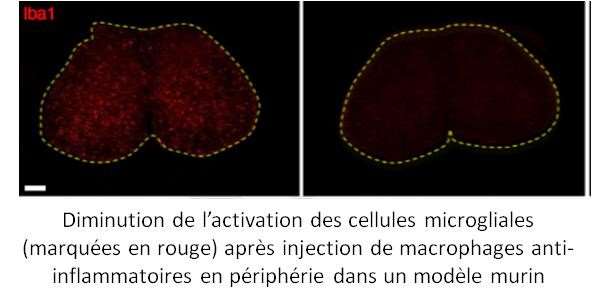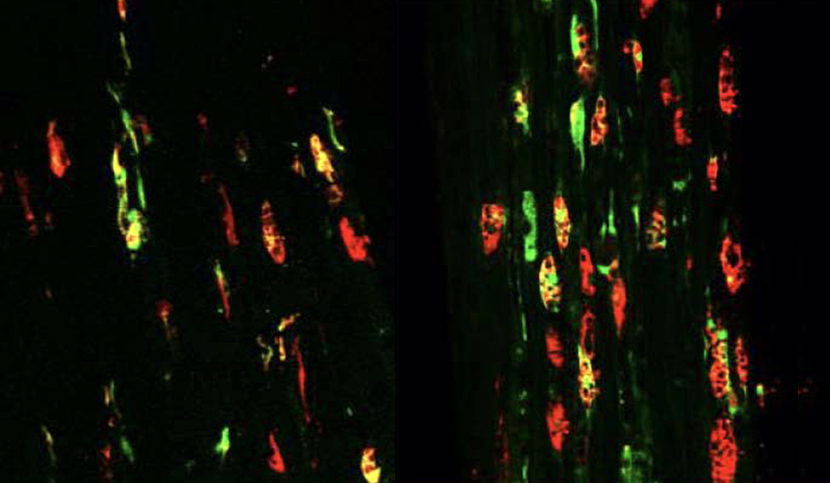Paris, October 19th, 2020 – ALS is characterized by the degeneration of motor neurons resulting in a progressive and irreversible deficit in walking and speech, until a complete paralysis of all muscles, including those controlling respiration. The team led by Séverine Boillée (Inserm researcher) at the Paris Brain Institute has just published work in the prestigious scientific journal Nature Neuroscience, paving the way to a new therapeutic approach for this still incurable disease.
Ten percent of ALS cases are familial, linked to mutations in genes, identified in 2/3 of cases. Experimental models (particularly in mice) in which the SOD1 gene is mutated, reproduce the clinical phenotype of the disease in humans and are used to study biological mechanisms of the disease, but also give the opportunity to test the efficiency and harmlessness of new treatments before using them in patients for therapeutic trials.
Spinal motor neurons affected in ALS have the particularity of being surrounded both by microglial cells in the spinal cord and by peripheral macrophages in the nerve, which is the part of the motor neuron exiting from the spinal column to connect peripheral muscles.
Macrophages are the blood cells at the forefront of the immune response whose main role is to defend the body against infections but also to contribute to heal the injured tissue during damage. Microglial cells (or microglia) are a subgroup of macrophages located in the central nervous system (spinal cord and brain).
While the role of microglia in motor neuron degeneration in ALS is now recognized, the role of circulating macrophages in disease progression was still controversial mainly because previous studies focused on their infiltration into the central nervous system while their implication, from the periphery, in the nerves during the course of the disease had not been fully demonstrated.
The objective of the project led by Séverine Boillée’s team was to show the involvement of these immune cells from the periphery since they would be more accessible in patients, in order to identify new therapeutic targets.
Using experimental mouse models and tissues of 11 patients suffering from ALS, the researchers were able to show for the first time:
– The ability of peripheral macrophages to influence, from the periphery, microglial cell activation in the central nervous system and motor neurons degeneration, showing a delay in the symptomatic phase and an increase in lifespan in the mouse model.

– Molecular profiles (transcriptomes) of microglial cells (in the spinal cord) and peripheral macrophages (in the sciatic nerve) are very different. This reflects the distinct response of these two cell types although closely related and reacting to the same event, the motor neuron death, and gives the possibility to identify new mechanisms to target for future therapies.
The authors of this work conclude for the first time that peripheral macrophages have an important role in the progression of amyotrophic lateral sclerosis (ALS), thus paving the way to new therapeutic strategies for patients.
In longer term, the development of research aiming at treating neurotoxic macrophages outside the central nervous system, i.e. in a less invasive manner could lead to a significant decrease in motor neuron death in ALS patients.
These results now constitute a promising treatment approach to be explored.
Source:
Modifying macrophages at the periphery has the capacity to change microglial reactivity and to extend ALS survival.
Aude Chiot, Sakina Zaïdi, Charlène Iltis, Matthieu Ribon, Félix Berriat, Lorenzo Schiaffino, Ariane Jolly, Pierre de la Grange, Michel Mallat, Delphine Bohl, Stéphanie Millecamps, Danielle Seilhean, Christian S. Lobsiger and Séverine Boillée
NATURE NEUROSCIENCE. DOI: 10.1038/s41593-020-00718-z.








